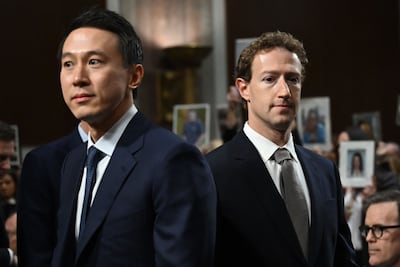Could the US Congress really ban TikTok? Yes, but that’s not the right question. Unfortunately, the better question – why are US officials pushing for a TikTok ban? – doesn’t have a simple explanation, but it’s important to look at the nuance and various motives, some legitimate and others jealousy based, to truly see what’s going on.
The most important factor in the rare, bipartisan push from both Republican and Democratic officials trying to rein in TikTok is data privacy, and the lack of transparency from ByteDance, parent company of TikTok, as to how user data is stored, used and subject to secretive policies from the Chinese government. Make no mistake, TikTok consumes a lot of user data, and it knows a lot about what you’re watching, what you’re rewinding, what you’re sharing, and what you’re stitching (to borrow a TikTok phrase).
The app and its algorithm are the envy of the social media world. TikTok’s chief executive, Shou Zi Chew, recently said as much during his appearance at Saudi Arabia’s Leap technology conference in Riyadh. What isn’t so clear, despite multiple testimonies before Congress, is the safety of all that data, and if it’s vulnerable to compromise by ByteDance, which is based out of China.
The US isn’t alone with these concerns, not by a long shot. Try using the TikTok app in India, and you’ll get slim to no engagement. Why? It’s banned there. The app is also banned from various government-issued devices in the UK, Canada and Norway, just to name a few countries. TikTok’s accumulated data is subject to Chinese government regulations, and those regulations and laws, despite ample international prodding, are far from clear.

Let’s circle back for a moment, to that TikTok algorithm that so many speak about with envy. Anybody who has ever used TikTok will tell you that it’s the secret sauce that makes the video-based social media app so addictive. It knows what you want to see better than you, and it is coveted, imitated and researched by startups all over the world.
That’s where fear and jealousy come into the picture.
In a post-industrial world, the US is used to being the country where innovations flourish and startups set the pace for the rest of the world. It’s not an exaggeration to say that Silicon Valley is known all over the world, along with the companies such as Apple, Meta, Google, and most recently, Nvidia and OpenAI. I could go on and on, but you get the point. TikTok broke that rhythm. Suddenly, there was a company and a social media platform that didn’t bloom from the US-based Silicon Valley garden, and whether or not elected officials and tech leaders will admit it, that made some a little uncomfortable.
Those US-based companies, which for so long were disrupting industries around the world, suddenly found themselves being disrupted and playing catchup.
Look at Meta, parent company of Facebook, Instagram and WhatsApp, to see the sort of envy that played out when TikTok’s slow but steady ascent turned into a rocket-ship blast off to social media dominance.
TikTok became the place to go, particularly for younger people on social media. User-generated video, and yes, the algorithm, made it very successful and lucrative. The incumbents, Facebook and Instagram, suddenly looked passe. So in 2020, Meta introduced Reels – short, vertical videos with various filters that let users make the most of their content.
Meanwhile, over at YouTube, owned by Google, something called Shorts were introduced. You guessed it – vertical videos that were shorter in length, which allowed users to scroll through like a slot machine to check out other content they might like.

Suddenly, a plethora of social media apps looked a lot like TikTok.
It still remains to be seen if YouTube Shorts will achieve mainstream success. Instagram, on the other hand, has quietly made up lost ground and managed to create an experience that’s eerily similar to TikTok. Go ahead and try using both TikTok and Instagram; I’m willing to bet that you occasionally get confused as to what app you’re in. It’s also routinely the top downloaded app in various app stores. Not an easy feat for an app that’s been around since 2010.
What’s my point? The corporate, institutional and entrepreneurial jealousy from TikTok’s success was and is very real. Meta founder Mark Zuckerberg once referred to TikTok as a “very effective competitor” in an interview with CNBC and acknowledged that his company was ″somewhat slow to this”. Now that there’s a formidable alternative to the platform (Instagram Reels), Congress has an opportunity to attempt a TikTok ban, while at the same time allowing users to potentially flock to a similar platform where it has more regulatory leverage.
I’m not suggesting that incumbent US social media companies and US elected officials conspired to knock TikTok off its pedestal. There are concerns about the lack of transparency over how TikTok uses and stores data that have yet to be addressed – and there are sometimes concerns about data leaks and privacy breaches related to media companies in the US.
I am, however, pointing out that jealousy, fear, institutional guilt, along with political concerns over personal data, are all creating a perfect storm that might be hard to survive.
As for TikTok, heavy is the head that wears the social media crown.

